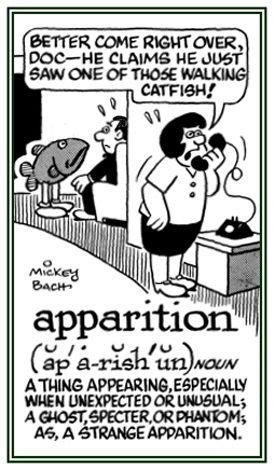-tion
(Latin: a suffix forming nouns from verbs of condition and action; an act or process: resumption, absorption; state or condition, redemption, exhaustion; something resulting from or otherwise related to an act or process, assumption, friction)
This unit is presenting a small fraction of the hundreds of words ending with the suffix of -tion; however, there is a significant number of words which may help everyone have a better understanding and appreciation of the use of this element.
antifriction
That which prevents friction.
1. A ghost or ghostlike image of a person: The new owners of the old house say they have seen strange apparitions in the garden at night resembling the former owners who seemed to be emerging from behind the trees and floating past their bedroom!
2. The appearance of something remarkable or unexpected; usually, an image of this type: A mother who lost her three children in a house fire claims that she has had apparitions in which they assured her that they are all right and that she shouldn't worry about them.

© ALL rights are reserved.

© ALL rights are reserved.
Go to this Word A Day Revisited Index
2. The appearance of something remarkable or unexpected; usually, an image of this type: A mother who lost her three children in a house fire claims that she has had apparitions in which they assured her that they are all right and that she shouldn't worry about them.


Go to this Word A Day Revisited Index
for a list of additional Mickey Bach illustrations.
apportion, proportion
apportion (uh POR shuhn; uh POHR shuhn) (verb)
To divide and to assign according to a plan; to allot: The officials will have to apportion the proceeds from the auction to the families.
proportion (pruh POR shuhn, pruh POHR shuhn) (noun)
A relationship between things or parts of things with respect to comparative magnitude, quantity, or degree: Some of the money goes to cover expenses, but a large proportion is donated to charity.
At the conclusion of the country fair, the organizers had to determine how to apportion the proceeds, ensuring that a generous proportion was designated for the local charities.
1. The relative position of two things that are next to each other: The vases were placed in apposition to each other on the shelf.
2. The quality of being side by side, not being front-to-front, but next to each other: The members of the marching band stood in apposition to each other as they prepared to play the national anthem.
3. A placing of two things conjointly or the fitting together of two things: The two pieces of the puzzle fit in perfect apposition.
4. A grammar relationship between noun phrases in which the relationship between two usually consecutive nouns or noun phrases that refer to the same person or thing and have the same relationship to other sentence elements: In the sentence, "My son, an actor, lives with me"; the phrase, "My son, an actor" is an example of an apposition. 5. In physiology, cell growth in which layers of material are deposited on existing ones: Dr. McMahon told Henry that the growth on the bottom of his heel was an example of cellular apposition.
2. The quality of being side by side, not being front-to-front, but next to each other: The members of the marching band stood in apposition to each other as they prepared to play the national anthem.
3. A placing of two things conjointly or the fitting together of two things: The two pieces of the puzzle fit in perfect apposition.
4. A grammar relationship between noun phrases in which the relationship between two usually consecutive nouns or noun phrases that refer to the same person or thing and have the same relationship to other sentence elements: In the sentence, "My son, an actor, lives with me"; the phrase, "My son, an actor" is an example of an apposition. 5. In physiology, cell growth in which layers of material are deposited on existing ones: Dr. McMahon told Henry that the growth on the bottom of his heel was an example of cellular apposition.
ascription
1. A statement that assigns, or attributes, something to someone or something else.
2. The social status derived from the circumstances into which someone is born.
3. The act of imputing or affirming to belong.
2. The social status derived from the circumstances into which someone is born.
3. The act of imputing or affirming to belong.
assertion
1. A positive statement or declaration, often without support or reason.
2. A declaration that is made emphatically (as if no supporting evidence were necessary).
3. The act of affirming or asserting or stating something.
4. A strong statement that something is true.
5. Etymology: from Old French assertion (14th century); from Late Latin assertionem, assertio; a noun of action from Latin asserere "to claim rights over something, to state, to maintain, to affirm"; from ad-, "to" + serere, "to join"; by "joining oneself" to a particular view, one "claimed" or "maintained" it.
2. A declaration that is made emphatically (as if no supporting evidence were necessary).
3. The act of affirming or asserting or stating something.
4. A strong statement that something is true.
5. Etymology: from Old French assertion (14th century); from Late Latin assertionem, assertio; a noun of action from Latin asserere "to claim rights over something, to state, to maintain, to affirm"; from ad-, "to" + serere, "to join"; by "joining oneself" to a particular view, one "claimed" or "maintained" it.
1. Something that is believed to be true without proof.
2. The action of taking to oneself; reception, adoption.
3. The action of receiving up into heaven; ascent to or reception into heaven; the reception of the Virgin Mary into heaven, with body preserved from corruption, which is a generally accepted doctrine in the Roman Catholic Church.
5. The taking upon oneself of a form or character; the formal taking of an office or a position.
6. In law, a promise or undertaking, either oral or in writing not sealed.
7. The action of laying claim to as a possession, unwarrantable claim, usurpation.
8. A taking too much upon oneself, a laying claim to undue importance; arrogance.
9. The taking of anything for granted as the basis of argument or action.
10. That which is assumed or taken for granted; a supposition, postulate.
11. In logic, the minor premise of a syllogism.
2. The action of taking to oneself; reception, adoption.
3. The action of receiving up into heaven; ascent to or reception into heaven; the reception of the Virgin Mary into heaven, with body preserved from corruption, which is a generally accepted doctrine in the Roman Catholic Church.
Also the feast held annually on the 15th of August in honor of this event.
4. The action of taking for or upon oneself.5. The taking upon oneself of a form or character; the formal taking of an office or a position.
6. In law, a promise or undertaking, either oral or in writing not sealed.
7. The action of laying claim to as a possession, unwarrantable claim, usurpation.
8. A taking too much upon oneself, a laying claim to undue importance; arrogance.
9. The taking of anything for granted as the basis of argument or action.
10. That which is assumed or taken for granted; a supposition, postulate.
11. In logic, the minor premise of a syllogism.
1. In medicine, a contraction of parts by applications; such as, the stopping of hemorrhages.
2. The power of contracting the parts of the body; that quality in medicines or other substances which causes contraction of the organic textures.
2. The power of contracting the parts of the body; that quality in medicines or other substances which causes contraction of the organic textures.
1. The act of keeping one’s mind on something or the ability to be aware of or to be interested in; mental concentration; mental readiness for such concentration.
2. Special care or consideration to something or someone.
2. Special care or consideration to something or someone.
1. The action or process of chafing one thing against another; mutual friction: The wind caused the attrition of the branches in the tree.
2. An abrading away, wearing or grinding down, by friction: The attrition of water on rocks by the ocean often results in their being worn down and becoming smooth.
3. In military applications, the gradual wearing away of morale and the powers of resistance by persistent attacks: General Smith ordered a gradual process of attrition against the enemy in order to exhaust and wear them down.
4. In the workplace, the gradual reduction of the size of a workforce by not replacing personnel lost through retirement or resignation: The Personnel Department at Sandra's company charted the attrition of employees.
2. An abrading away, wearing or grinding down, by friction: The attrition of water on rocks by the ocean often results in their being worn down and becoming smooth.
3. In military applications, the gradual wearing away of morale and the powers of resistance by persistent attacks: General Smith ordered a gradual process of attrition against the enemy in order to exhaust and wear them down.
4. In the workplace, the gradual reduction of the size of a workforce by not replacing personnel lost through retirement or resignation: The Personnel Department at Sandra's company charted the attrition of employees.
auction
1. A trial performance, as by an actor, dancer, or musician, to demonstrate suitability or skill: Mary played her violin in an audition in order to be accepted to the local orchestra.
2. The sense or power of hearing (no plural form): Dr. Good told Jim that his audition was poor and that he should wear hearing aids.
2. The sense or power of hearing (no plural form): Dr. Good told Jim that his audition was poor and that he should wear hearing aids.
An audition is the act of hearing or the sensation and perception of sounds produced by stimulation of nerve receptors in the ear.
An automatic or spontaneous ignition of some or all of the fuel-air mixture in the combustion chamber of an internal combustion engine of a vehicle when it is turned on.
autoinfection
1. Reinfection by an organism existing within the body or transferred from one part of the body to another.
2. The direct reinfection of a host individual by larval offspring of an existing parasite.
2. The direct reinfection of a host individual by larval offspring of an existing parasite.


